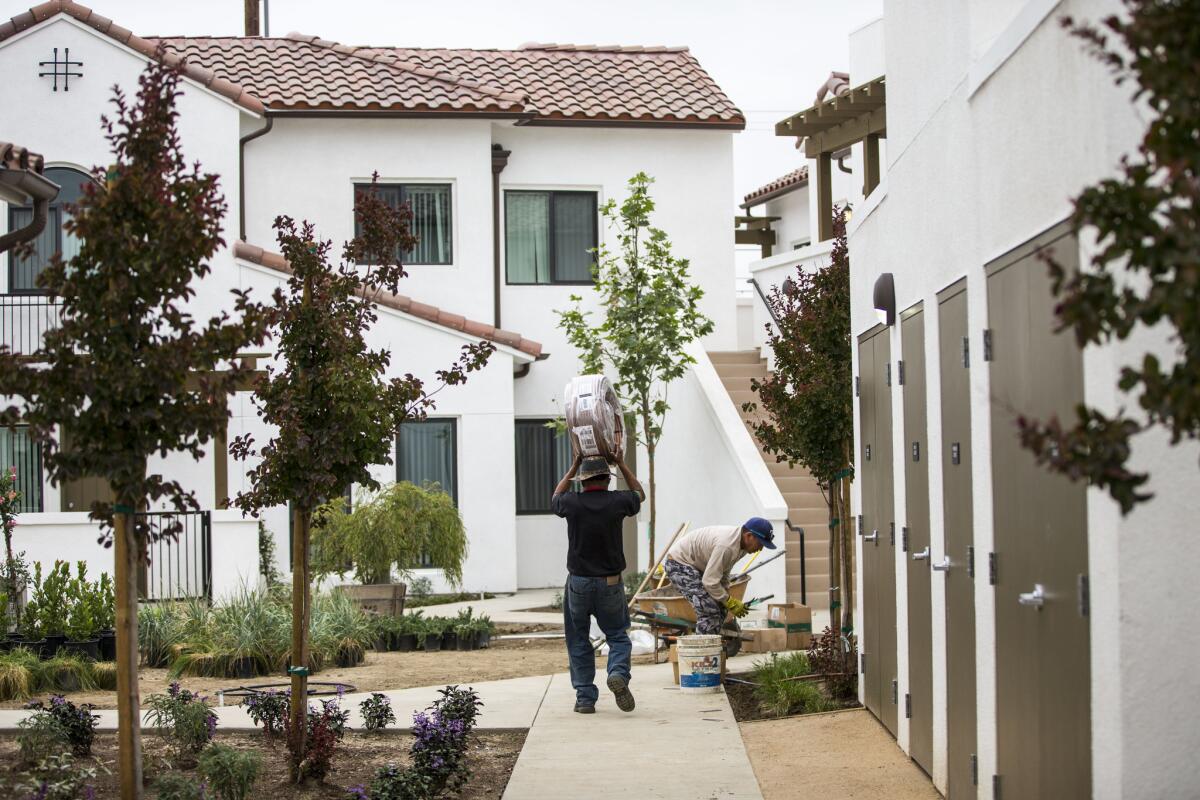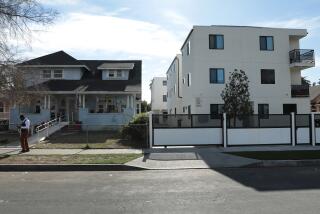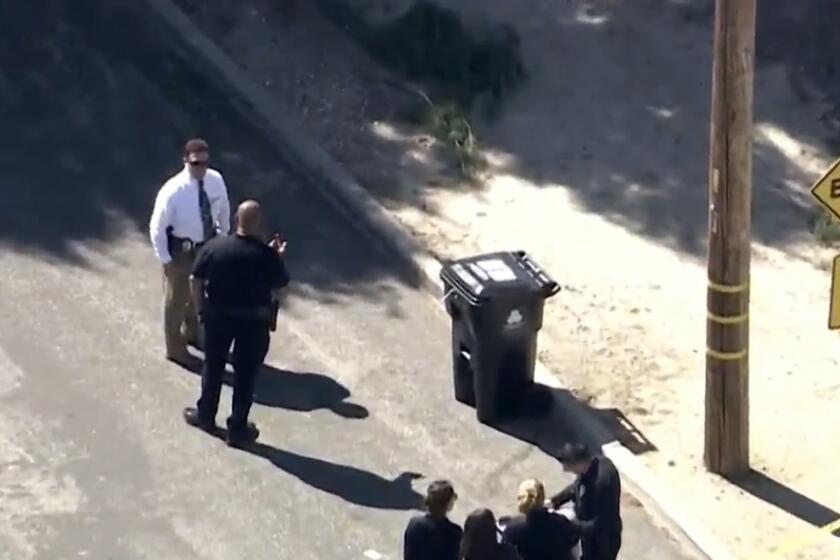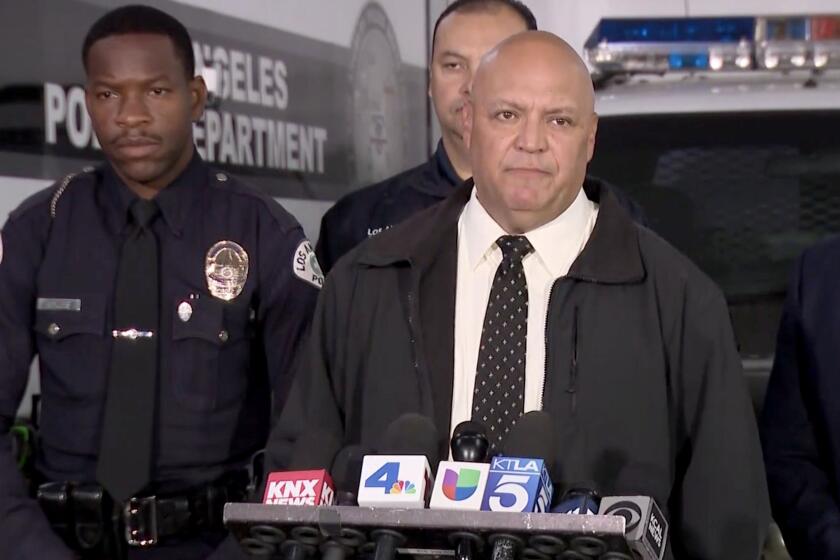Vernon’s population to double -- to 200 -- as privately owned housing opens

Workers put the finishing touches on the Vernon Village Park Apartments. The 45-unit complex will double the population of the five-square mile city, located five miles south of downtown Los Angeles.
There was a time when the city of Vernon went to great lengths to keep people from moving into the small industrial city south of downtown L.A.
Vernon had only about 100 residents, and the city owned all the homes, which it gave to employees and relatives at heavily subsidized rates. Over the years, the city evicted dissenters, drove out newcomers and even tore down homes to prevent outsiders from moving in.
Now, Vernon’s population is expected to boom, thanks to a reform effort the city embarked on after a series of corruption scandals almost caused the city to be dissolved.
Next month the city will officially open Vernon Village Park Apartments, welcoming 102 new residents. The apartments will be Vernon’s first privately owned residences in decades and mark a dramatic pivot for a city that fought so hard for so long to keep people out.
“The times have changed, and Vernon is changing with the times,” said Mayor Michael McCormick, who joined the council in 1974. “I’m looking forward to meeting the residents.”
The $16-million apartment complex, developed by Meta Housing Corp., sits along the Los Angeles River, a short walk from the 710 Freeway.
Of the 45 new units, 12 will be occupied by families who work for private companies in Vernon. The rest will be rented out to people from surrounding cities and communities.
Those who move into Vernon will find that the city isn’t like any other town they’re likely to encounter. There are about 1,800 businesses in Vernon, with roughly 55,000 workers. The smells occasionally wafting around the city from businesses such as the Farmer John meat processing plant can be off-putting. But at night and on weekends, there is little traffic to complain about, and crime is low.
“I love the quietness,” said Councilwoman Melissa Ybarra, who said Vernon has a peculiar, industrial charm for the few who have ever called it home.
The new housing is part of a series of reforms Vernon undertook after staving off a legislative effort to disincorporate the city.
Since state lawmakers threatened to disband the city in 2011, Vernon has slashed salaries of council members, set term limits and imposed more competitive bidding for city contracts.
But none of the changes are as dramatic as the creation of new apartments that will double Vernon’s population.
Historically, Vernon’s small and tightly controlled population allowed city leaders to avoid contested elections for generations. Vernon was controlled for decades by a family that critics claim operated the town like a fiefdom.
There was little scrutiny of how government worked. One city administrator made $1.65 million one year, and no one who lived in the city would think to publicly complain. In recent years, three top city leaders were charged with public corruption.
The new apartments are supposed to introduce a demographic to Vernon that will be independent of the influence of City Hall.
“It is the critical piece from all the reforms,” said Senate President Pro Tem Kevin de León (D-Los Angeles). “When you double the electorate with new housing, that brings independent voters...and that’s true democracy.”
Despite the steps Vernon has taken to change the way it does political business, the city remains a curiously configured oddity — California’s smallest city — that struggles to scrub away the stain of suspicion.
Its past has now inspired television programming: The second season of the HBO series “True Detective” is modeled in part on the corrupt history of Vernon, which in the show is called “Vinci.”
Ybarra, who was elected to fill her late father’s council seat as a reform candidate, said she knows that there will be skeptics who think the city is just doing what it has to do to avoid being targeted for dissolution again. But she said Vernon really wants to do better than its past.
“What happened in the past happened, and we’re going to take the extra steps to move forward,” Ybarra said. “Vernon is going to grow with the help of the residents.”
Vernon’s near collision course with political extinction came shortly after it was revealed that city administrators were collecting huge salaries.
At the same time, the city had a closed-door policy for new residents.
In 2006, a small group of people intent on forcing the first contested election in a generation moved into a boxy commercial building in the industrial town. Vernon utility trucks quickly arrived, and workers turned off the power and put red tags on the property. Armed private investigators followed some people. . One investigator was arrested in South Pasadena after drawing his gun on an aspiring council candidate.
In 1980, the town’s retired police chief declared himself a candidate for the Vernon council — and was promptly evicted from his city-owned home.
The scandals led then-Assembly Speaker John Pérez (D-Los Angeles) to try to disband Vernon by introducing legislation that would disincorporate any city with fewer than 150 residents.
The legislation—AB 46—was approved in the assembly, but ultimately died in the Senate. De León said he initially supported it but changed his mind when he considered the economic impact it would have on Vernon and the county. He pushed the city to agree to a series of reforms.
“The culture of corruption was very deep, there’s no question about it,” De León said. “It was a company town controlled by the corrupt politicians and City Hall staff.”
John Kruissink, a Vernon historian and former consultant, says the city’s industrial success would have been difficult with a large population.
“They did everything right in the beginning,” Kruissink said of the city’s founders. “It was sensible not to have a large population.”
When the city was founded in 1905, it was created solely to foster industry, he said. Its motto is “Exclusively Industrial.”
Vernon actually used to have a larger population, but in the 1920s saw a decline after an outbreak of a plague. Homes were burned or demolished and later replaced with factories and manufacturers. As time passed, the city operated more like a business, Kruissink said, providing businesses with power at low utility rates.
When Esmeralda Benavidez, 24, and her 9-year-old daughter Natalie move from a cramped South L.A. apartment into a spacious new unit in Vernon, she said she won’t think much about the city’s complicated past.
The kitchen will have chocolate-colored wooden cabinets and marble countertops, energy-efficient appliances. There will be a small playground for children and a computer lab, and when she stands on her balcony, Benavidez will have a view of the L.A. skyline and the San Gabriel Mountains.
“I’m very happy and excited,” she said. “We’ll have our own place.”
Twitter: @latvives
More to Read
Start your day right
Sign up for Essential California for news, features and recommendations from the L.A. Times and beyond in your inbox six days a week.
You may occasionally receive promotional content from the Los Angeles Times.







